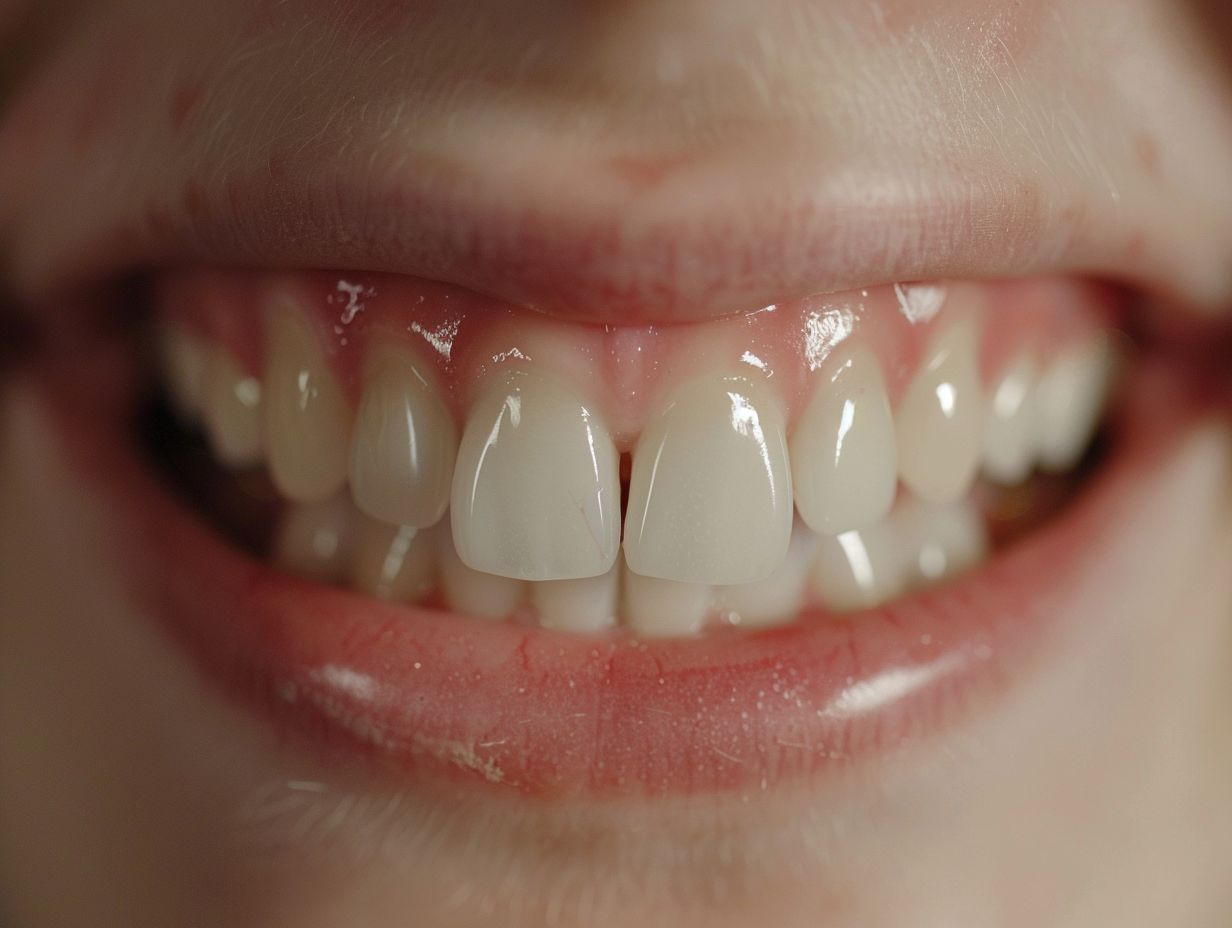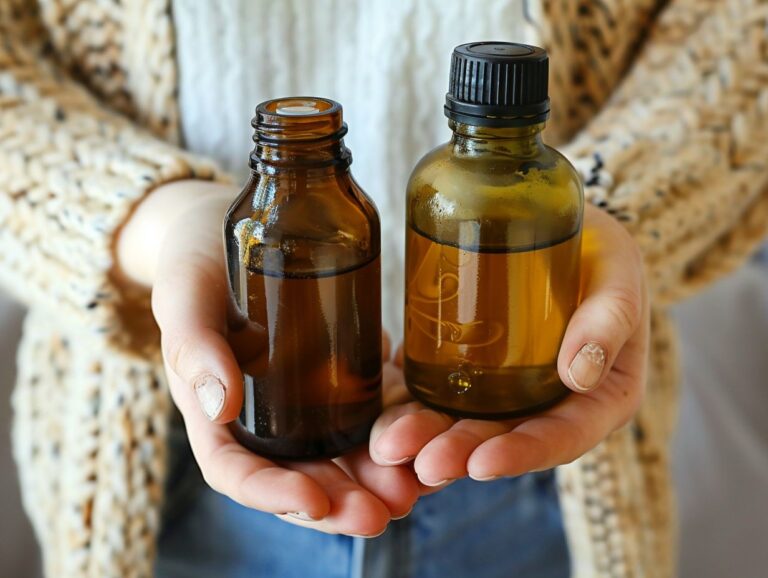Can Essential Oils Whiten Teeth
Essential oils have become a popular alternative for teeth whitening due to their natural properties.
We explore what essential oils are, how they work, and the benefits they offer for achieving a brighter smile.
From their antibacterial properties to their ability to remove stains and reduce inflammation in the gums, essential oils like peppermint, tea tree, clove, and lemon oil are key players in promoting oral health.
Discover the best ways to use essential oils stain teeth for teeth whitening and learn about any potential risks or side effects.
Unlock the power of essential oils for a healthier, brighter smile!
Key Takeaways:
What Are Essential Oils?
Essential oils are concentrated extracts derived from plants that capture the plant’s scent and flavor, also known for their therapeutic properties. In terms of oral health, essential oils have gained popularity for their natural remedies and benefits in teeth whitening.
How Do Essential Oils Work?
Essential oils work by interacting with the body at a cellular level due to their unique composition. In terms of oral health, essential oils can penetrate the oral tissues and target bacteria responsible for plaque formation and tooth decay, promoting a healthier mouth.
What Are the Benefits of Essential Oils for Teeth Whitening?
The benefits of essential oils for teeth whitening extend beyond aesthetics to include their natural cleansing properties that help remove stains and promote healthier enamel. Essential oils like peppermint oil and turmeric offer a holistic approach to oral care, addressing both discoloration and oral hygiene.
Do Essential Oils Have Antibacterial Properties?
Essential oils possess potent antibacterial properties that can help combat harmful bacteria in the mouth, reducing the risk of dental diseases such as cavities and gum inflammation. Incorporating essential oils in oral care routines can contribute to maintaining optimal oral health.
These essential oils act as natural alternatives to chemical-laden dental products, providing a more organic and holistic approach to oral hygiene. The antibacterial effects of essential oils can not only target bacteria responsible for plaque formation but also help freshen breath and soothe irritated gums.
Studies have shown that certain essential oils like tea tree, peppermint, and clove possess remarkable antimicrobial properties, making them effective tools in combating oral bacteria. By incorporating these oils into your daily oral care regimen, you can enhance the health of your teeth and gums, potentially reducing the need for extensive dental treatments in the future.
Can Essential Oils Help Remove Stains on Teeth?
Essential oils are known for their stain removal properties, capable of breaking down stubborn stains on teeth caused by various factors such as food, beverages, and smoking.
In terms of maintaining oral hygiene and achieving a radiant smile, the natural cleansing abilities of essential oils play a significant role. The antimicrobial properties of certain essential oils help in reducing bacteria in the mouth, which can lead to a decrease in plaque buildup and prevent teeth stains. The refreshing aroma of essential oils like peppermint or clove can provide a pleasant experience during oral care routines, making it more enjoyable and effective.
Do Essential Oils Promote Saliva Production?

Incorporating these essential oils in your daily oral care routine can have significant benefits for your oral health. Saliva not only helps in digestion, but it also plays a vital role in protecting your teeth and gums. By increasing saliva production through the use of essential oils, you can improve your overall oral hygiene. Saliva contains natural enzymes that help in breaking down food particles and protecting your mouth from harmful bacteria.
To maintain a healthy mouth, it is essential to keep saliva flowing. Essential oils such as peppermint, clove, and tea tree oil have been found to be particularly effective in stimulating saliva production. These oils not only freshen your breath but also promote a healthy balance of oral bacteria, leading to improved oral hygiene.
Regular use of essential oils in your oral care routine can help keep your mouth feeling clean and healthy. Remember, a healthy mouth starts with good saliva flow, and essential oils can be a natural and effective way to support this crucial aspect of oral health maintenance.
Can Essential Oils Help Reduce Inflammation in the Gums?
Essential oils possess anti-inflammatory properties that can help alleviate gum inflammation and promote gum health. Incorporating essential oils in oral care routines can contribute to reducing gum irritation and maintaining healthy oral tissues.
In terms of oral health, gum inflammation is a common issue that many people face. The benefits of essential oils in treating this condition cannot be overstated. These natural extracts are known for their anti-inflammatory properties, which can help soothe the gums and reduce swelling. By incorporating essential oils like peppermint, tea tree, or clove into your daily oral hygiene routine, you can provide relief to your irritated gums and support overall gum health.
What Are the Best Essential Oils for Teeth Whitening?
In terms of teeth whitening, certain essential oils stand out for their efficacy and safety. Peppermint oil, tea tree oil, clove oil, and lemon oil are among the best essential oils known for their whitening properties and oral health benefits.
Peppermint Oil
Peppermint oil is a popular essential oil known for its refreshing taste and natural antibacterial properties, making it an excellent choice for teeth whitening. This oil can help freshen breath, reduce bacteria, and promote oral health when used as part of a dental care routine.
One of the key benefits of peppermint oil is its ability to combat harmful bacteria that can lead to plaque build-up, cavities, and gum disease. By incorporating peppermint oil into your oral hygiene regimen, you can harness its powerful antibacterial properties to maintain a healthier mouth. The refreshing aroma of peppermint oil can help mask bad breath, leaving your mouth feeling clean and revitalized.
Tea Tree Oil
Tea tree oil is recognized for its antimicrobial and anti-inflammatory properties, making it a valuable addition to oral care routines. When used properly, tea tree oil can help combat oral bacteria, reduce gum inflammation, and contribute to overall oral hygiene.
Its efficacy against harmful bacteria in the mouth is particularly remarkable. The active compounds in tea tree oil work by disrupting the cell membranes of these bacteria, ultimately inhibiting their growth and reducing the risk of oral infections. Its anti-inflammatory properties can help soothe swollen gums and alleviate discomfort. When incorporated into a regular oral hygiene regimen, tea tree oil can serve as a natural ally in maintaining healthy teeth and gums.
Clove Oil
Clove oil is renowned for its analgesic and antibacterial properties, making it a versatile essential oil for oral health. Incorporating clove oil in oral care routines can help alleviate tooth sensitivity, reduce bacteria, and promote gum health.
Clove oil possesses natural antimicrobial qualities that can assist in combating oral infections and inflammations. Its ability to numb pain and reduce inflammation in the gums makes it a beneficial ingredient in dental care products. The aromatic and refreshing essence of clove oil adds a pleasant touch to oral hygiene routines, encouraging better compliance with regular brushing and flossing.
Lemon Oil

Lemon oil is known for its astringent properties and refreshing citrus scent, making it a popular choice for teeth whitening. When used judiciously, lemon oil can help brighten teeth, reduce stains, and freshen breath, offering a natural solution for oral care.
This essential oil derived from lemons is not only effective in combating common oral issues but also possesses antibacterial and antimicrobial properties that contribute to a healthier mouth. Its ability to gently whiten teeth without harsh chemicals is especially beneficial for those looking to remove stubborn stains naturally. The refreshing aroma of lemon oil provides a pleasant sensory experience during oral hygiene routines, leaving the mouth feeling clean and revitalized.
How to Use Essential Oils for Teeth Whitening?
Incorporating essential oils into your oral care routine for teeth whitening can be done through various methods such as oil pulling, DIY toothpaste recipes, and mouthwash solutions. These applications allow the natural properties of essential oils to enhance oral hygiene and promote a brighter smile.
Oil Pulling
Oil pulling involves swishing oil, such as coconut oil or sesame oil, in the mouth for a specified duration to remove toxins, bacteria, and stains from the teeth. This ancient practice can help improve oral health and contribute to a brighter smile.
Among the various benefits of oil pulling, one notable advantage is its ability to naturally whiten teeth. The swishing action helps dislodge plaque and stains, leading to a cleaner and brighter smile over time. Coconut oil, in particular, is often recommended for its antimicrobial properties, which can aid in fighting harmful bacteria in the mouth. For optimal results, experts suggest swishing the oil in your mouth for about 15-20 minutes before spitting it out. This process is believed to draw out impurities and improve overall oral detoxification.
DIY Toothpaste
Creating your own toothpaste using essential oils like peppermint oil, baking soda, and coconut oil can provide a natural alternative for teeth whitening and oral hygiene. DIY toothpaste recipes offer personalized oral care solutions with the added benefits of essential oils.
Peppermint oil not only adds a refreshing flavor to your toothpaste but also possesses antibacterial properties that help fight against harmful bacteria in the mouth, promoting healthier gums and fresher breath. Coconut oil, known for its antimicrobial qualities, combines with baking soda to create a gentle yet effective abrasive texture for cleaning teeth without being harsh on enamel.
Experimenting with different combinations of essential oils allows you to tailor your toothpaste to your specific oral health needs. Orange essential oil can add a citrus twist while providing additional antibacterial benefits, and tea tree oil is a popular choice known for its antifungal and antiseptic properties.
Mouthwash
Essential oil-infused mouthwash solutions can freshen breath, combat bacteria, and promote oral health when used as part of a daily oral care routine. DIY mouthwash recipes with essential oils offer a natural and effective way to maintain oral hygiene.
When you create your homemade mouthwash with essential oils, you have the freedom to tailor the blend to your preferences. Whether you enjoy the refreshing zing of peppermint, the antibacterial properties of tea tree oil, or the soothing benefits of lavender, the options are endless. By leveraging the capabilities of these natural oils, you avoid the artificial additives and harsh chemicals often found in commercial mouthwashes. Essential oils can help to maintain the natural balance of bacteria in the mouth, promoting a healthier oral environment. So why not give a go at mixing up your personalized concoction to enhance your oral care routine?
Are There Any Risks or Side Effects of Using Essential Oils for Teeth Whitening?
While essential oils offer natural solutions for teeth whitening, it is essential to be aware of potential risks and side effects. Some individuals may experience sensitivity, enamel damage, or staining when using essential oils excessively or in high concentrations.
Conclusion

Frequently Asked Questions
Can essential oils really whiten teeth?
Yes, certain essential oils have been found to have natural whitening properties that can help brighten and whiten teeth.
Which essential oils are known for their teeth whitening benefits?
Some common essential oils used for teeth whitening include peppermint, clove, lemon, and tea tree.
How do I use essential oils for teeth whitening?
There are a few ways to use essential oils for teeth whitening, such as adding a drop to your toothpaste, swishing with a diluted solution, or using a DIY whitening mouthwash.
Are essential oils safe for whitening teeth?
Yes, when used properly and in moderation, essential oils are generally safe for whitening teeth. However, it is important to dilute them properly and not use them too frequently.
Can essential oils replace traditional teeth whitening methods?
While essential oils may help whiten teeth, they should not be used as a replacement for traditional teeth whitening methods. They can be used as a natural supplement to your regular oral hygiene routine.
How long does it take to see results from using essential oils for teeth whitening?
It may take a few weeks to see noticeable results from using essential oils for teeth whitening. Consistency is key, so make sure to incorporate them into your oral care routine regularly for best results.







